
 (732) 246-1377
(732) 246-1377
 (732) 246-1377
(732) 246-1377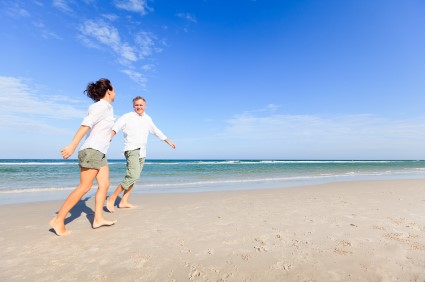 Hyperhidrosis can be categorized either as primary or secondary. Primary hyperhidrosis is characterized as affecting the hands, underarms, and the feet. Secondary is caused by an underlying medical condition such as diabetes or a hormonal disease. Both primary and secondary hyperhidrosis lead to excessive sweating. Treatment options for hyperhidrosis involve prescription antiperspirant and deodorant, botox injections, surgical treatment known as sympathectomy or the removal of the sympathetic nerve, and electrical treatment known as lontophoresis.
Hyperhidrosis can be categorized either as primary or secondary. Primary hyperhidrosis is characterized as affecting the hands, underarms, and the feet. Secondary is caused by an underlying medical condition such as diabetes or a hormonal disease. Both primary and secondary hyperhidrosis lead to excessive sweating. Treatment options for hyperhidrosis involve prescription antiperspirant and deodorant, botox injections, surgical treatment known as sympathectomy or the removal of the sympathetic nerve, and electrical treatment known as lontophoresis.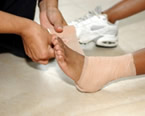 Achilles tendon injuries, or tendinopathy, “[are] one of the most common causes of pain felt behind the heel and up the back of the ankle when walking or running.” Achilles tendon injuries are more likely to develop in those who participate in extensive physical activity. They occur when too much pressure is exerted on the Achilles tendon. The stress can lead to the Achilles tendon either becoming strained or ruptured. Treatment options for an Achilles tendon injury involves icing the injured area, using a leg brace, and therapy.
Achilles tendon injuries, or tendinopathy, “[are] one of the most common causes of pain felt behind the heel and up the back of the ankle when walking or running.” Achilles tendon injuries are more likely to develop in those who participate in extensive physical activity. They occur when too much pressure is exerted on the Achilles tendon. The stress can lead to the Achilles tendon either becoming strained or ruptured. Treatment options for an Achilles tendon injury involves icing the injured area, using a leg brace, and therapy.
Achilles tendon injuries need immediate attention to avoid future complications. If you have any concerns contact one of our podiatrists of Livingston Footcare. Our doctors will treat your foot and ankle needs.
What is the Achilles Tendon?
The Achilles tendon is a tendon that connects the lower leg muscles and calf to the heel of the foot. It is the strongest tendon in the human body and is essential for making movement possible. Because this tendon is such an integral part of the body, any injuries to it can cause severe difficulties and should immediately be presented to a doctor.
What are the symptoms of an Achilles Tendon Injury?
There are various types of injuries that can affect the Achilles tendon. The two most common are Achilles tendinitis and ruptures of the tendon.
Achilles Tendinitis Symptoms
-Inflammation
-Dull to Severe Pain
-Increased blood flow to the tendon
-Thickening of the tendon
Rupture Symptoms
-Extreme pain and swelling in the foot
-Total immobility
Treatment and Prevention
Achilles tendon injuries are diagnosed by a thorough physical evaluation, which can include an MRI. Treatment involves rest, physical therapy, and in some cases, surgery. However, various preventative measures can be taken to avoid these injuries, such as:
-Thorough stretching of the tendon before and after exercise
-Strengthening exercises like calf raises, squats, leg curls, leg extensions, leg raises, lunges, and leg presses
If you have any questions feel free to contact our office located in North Brunswick, NJ. We offer the newest diagnostic tools and technologies to fit your foot and ankle needs.
 As our children are transitioning into competitive sports with the changing of seasons, the American College of Foot and Ankle Surgeons (ACFAS) suggests that parents “take the necessary precautions to prevent foot and ankle injuries that can occur when going from indoor to outdoor sports.” Sports-related injuries can occur across any season or physical activity, according to Gregory Catalano, foot and ankle surgeon and member of the ACFAS. Tips for preventing the risk of injuries include getting medical evaluations, increasing break time between activity, wearing proper and comfortable shoes, communicating with your children, and using the RICE, or the rest, ice, compression and elevation method to treat sports-related injuries.
As our children are transitioning into competitive sports with the changing of seasons, the American College of Foot and Ankle Surgeons (ACFAS) suggests that parents “take the necessary precautions to prevent foot and ankle injuries that can occur when going from indoor to outdoor sports.” Sports-related injuries can occur across any season or physical activity, according to Gregory Catalano, foot and ankle surgeon and member of the ACFAS. Tips for preventing the risk of injuries include getting medical evaluations, increasing break time between activity, wearing proper and comfortable shoes, communicating with your children, and using the RICE, or the rest, ice, compression and elevation method to treat sports-related injuries.
Sports related foot and ankle injuries need proper treatment before players can go back to their regular routines. If you have any concerns, contact one of our podiatrists of Livingston Footcare. Our doctors will treat your foot and ankle needs.
Sport Related Foot and Ankle Injuries
Foot and ankle injuries are a common occurrence when it comes to athletes of any sport. While many athletes dismiss the initial aches and pains, the truth is that ignoring potential foot and ankle injuries can lead to serious problems. As athletes continue to place pressure and strain the area further, a mild injury can turn into something as serious as a rupture and may lead to a permanent disability. There are many factors that contribute to sports related foot and ankle injuries, which include failure to warm up properly, not providing support or wearing bad footwear. Common injuries and conditions athletes face, including:
● Plantar Fasciitis
● Plantar Fasciosis
● Achilles Tendinitis
● Achilles Tendon Rupture
● Ankle Sprains
Sports-related injuries are commonly treated using the RICE method. This includes rest, applying ice to the injured area, compression and elevating the ankle. More serious sprains and injuries may require surgery, which could include arthroscopic and reconstructive surgery. Rehabilitation and therapy may also be required in order to get any recovering athlete to become fully functional again. Any unusual aches and pains an athlete sustains must be evaluated by a licensed, reputable medical professional.
If you have any questions feel free to contact our office located in North Brunswick, NJ. We offer the newest diagnostic tools and technologies to fit your foot and ankle needs.
Foot and ankle injuries are common among people who participate in sports. Several factors contribute to this. They include failing to stretch or warm up properly, not wearing the proper type of shoe and not taping or providing other types of support for the ankle or foot. The most common foot and ankle injuries suffered by people involved in sports are plantar fasciitis, ankle sprains and Achilles tendon damage or ruptures. If not treated properly, they can lead to permanent disability.
Treating these injuries is relatively simple if they are identified and addressed early. Many athletes dismiss the initial aches and pains associated with injury as just soreness or tired muscles. Their first response is usually to try to work through it. This can lead to serious problems. Many minor injuries are made far more serious when athletes continue to put strain and pressure on them. That attitude can change a mild strain into a serious strain and a minor tear into a rupture. Athletes should have unusual aches and pains evaluated by a skilled medical professional.
Plantar fasciitis is a painful injury. It is inflammation of the plantar fascia, the thick band of tissue running from the heel to the base of the toes. If left untreated, it can lead to a degenerative disease called plantar fasciosis. There are several effective treatments for this ailment. Doctors often prescribe rest, massages, stretching, night splints, physical therapy, anti-inflammatory medication, corticosteroids or surgery, usually in that order. The most effective treatment for plantar fasciitis is orthotics, which offers foot support. Surgery is occasionally used as a last resort, but it comes with the risk of nerve damage and infection and often does not stop the pain.
The Achilles tendon is the largest tendon in the body. It connects the calf muscles to the heel bone. Running, jumping and walking all impact this tendon. Two common injuries to the Achilles tendon are tendonitis and a rupture of the tendon. Tendonitis is inflammation in the tendon often caused by an increase in the amount of stress placed on it. Non-surgical treatmentsinclude rest, ice or anti-inflammatory medication. A rupture (tear) of the Achilles tendon can be treated by placing the lower leg in a cast for several weeks or with surgery. Many physicians feel surgery is the better option because it lowers the risk of re-ruptures. Both methods require 4 to 6 months of rehabilitation.
Ankle sprains are the most common sports related foot and ankle injury. A sprain occurs when the ligament holding the ankle bones and joint stretches beyond its normal range. It can be treated non-surgically with a combination of rest, ice wrapped around the joint for 30 minutes immediately after injury, compression by a bandage and elevating the ankle above the heart for 48 hours. This combination is referred to as RICE. Severe ankle sprains in which the ligaments are torn may require reconstructive surgery followed by rehabilitation.
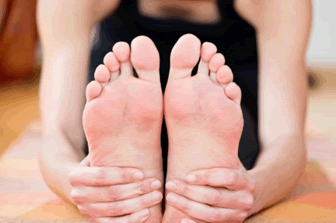 If you’re waking in the mornings with pain in your feet, it may be because you have plantar fasciitis. Plantar fasciitis is described as heel pain that occurs as a result of inflammation and injury of the plantar fascia, which stretches along the bottom of our feet’s soles. Our plantar fascias are “prone to overuse injuries,” and symptoms of the condition include “morning stiffness, stiffness after working out, and pain while walking barefoot.” Treating your plantar fasciitis involves investing in custom orthotics, changing your footwear, anti-inflammatory medication, splints and physical therapy.
If you’re waking in the mornings with pain in your feet, it may be because you have plantar fasciitis. Plantar fasciitis is described as heel pain that occurs as a result of inflammation and injury of the plantar fascia, which stretches along the bottom of our feet’s soles. Our plantar fascias are “prone to overuse injuries,” and symptoms of the condition include “morning stiffness, stiffness after working out, and pain while walking barefoot.” Treating your plantar fasciitis involves investing in custom orthotics, changing your footwear, anti-inflammatory medication, splints and physical therapy.
Plantar fasciitis can be very painful and inconvenient. If you are experiencing heel pain or symptoms of plantar fasciitis, contact one of our podiatrists of Livingston Footcare. Our doctors will treat your foot and ankle needs.
What is Plantar Fasciitis?
Plantar fasciitis is the inflammation of the thick band of tissue that runs along the bottom of your foot, known as the plantar fascia, and causes mild to severe heel pain.
What Causes Plantar Fasciitis?
· Excessive running
· Non-supportive shoes
· Overpronation
· Repeated stretching and tearing of the plantar fascia
How Can It Be Treated?
· Conservative measures – anti-inflammatories, ice packs, stretching exercises, physical therapy, orthotic devices
· Shockwave therapy – sound waves are sent to the affected area to facilitate healing and are usually used for chronic cases of plantar fasciitis
· Surgery – usually only used as a last resort when all else fails. The plantar fascia can be surgically detached from the heel
While very treatable, plantar fasciitis is definitely not something that should be ignored. Especially in severe cases, speaking to your doctor right away is highly recommended to avoid complications and severe heel pain. Your podiatrist can work with you to provide the appropriate treatment options tailored to your condition.
If you have any questions feel free to contact our office located in North Brunswick, NJ. We offer the newest diagnostic tools and technologies to fit your foot and ankle needs.
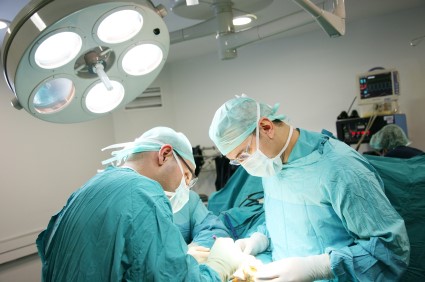 Kody Walker, Arkansas’ running back, had to undergo surgery for suffering a broken foot during practice in April. “It’s a pretty standard foot injury that we’ve dealt with in the past and we expect him to be full-go by June. If anyone knows how to battle adversity it’s Kody Walker,” said Arkansas coach Bret Bielema. Walker had missed games in previous seasons due to a broken hand and other injuries.
Kody Walker, Arkansas’ running back, had to undergo surgery for suffering a broken foot during practice in April. “It’s a pretty standard foot injury that we’ve dealt with in the past and we expect him to be full-go by June. If anyone knows how to battle adversity it’s Kody Walker,” said Arkansas coach Bret Bielema. Walker had missed games in previous seasons due to a broken hand and other injuries.
Foot surgery is sometimes necessary to fix a foot ailment. To learn more, contact one of our podiatrists of Livingston Footcare. Our doctors will treat your foot and ankle needs.
When Is Surgery Necessary?
Foot and ankle surgery is generally reserved for cases in which less invasive, conservative procedures have failed to help with the problem. Some of the cases in which surgery may be necessary are:
● Removing foot deformities like bone spurs and bunions
● Severe arthritis that has caused bone issues
● Cosmetic reconstruction
What Types of Surgery Are There?
The type of surgery you receive will depend on the nature of the problem you have. Some of the possible surgeries include:
● Bunionectomy for painful bunions
● Surgical fusion for realignment of bones
● Neuropathy decompression surgery to treat nerve damage
Benefits of Surgery
Although surgery is usually a last resort, it can provide more complete pain relief compared to non-surgical methods and may allow you to finally resume full activity.
Surgical techniques have also become increasingly sophisticated. Techniques like endoscopic surgery allow for smaller incisions and faster recovery times.
If you have any questions feel free to contact our office located in North Brunswick, NJ. We offer the newest diagnostic tools and technologies to fit your foot and ankle needs.
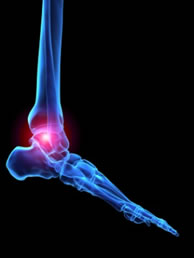 National health figures indicate that “roughly one in four women have been given diagnoses of arthritis, compared with about one in five men.” Many different factors come into play of why arthritis happens, including age, weight, and previous trauma injuries. However, the exact cause of why arthritis affects women more than men is unknown. There are many types of arthritic disorders, including osteoarthritis and rheumatoid arthritis. Because arthritis is an autoimmune disease, that may be one potential cause to women being more prone to the disease since they have “more robust immune systems” compared to men, which could lead to the immune systems attacking the bodies’ healthy cells.
National health figures indicate that “roughly one in four women have been given diagnoses of arthritis, compared with about one in five men.” Many different factors come into play of why arthritis happens, including age, weight, and previous trauma injuries. However, the exact cause of why arthritis affects women more than men is unknown. There are many types of arthritic disorders, including osteoarthritis and rheumatoid arthritis. Because arthritis is an autoimmune disease, that may be one potential cause to women being more prone to the disease since they have “more robust immune systems” compared to men, which could lead to the immune systems attacking the bodies’ healthy cells.
Arthritis can be a difficult condition to live with. If you are seeking treatment,contact one of our podiatrists of Livingston Footcare. Our doctors will treat your foot and ankle needs.
Arthritic Foot Care
Arthritis is a joint disorder that involves inflammation of different joints in your body, such as in your feet. Arthritis is often caused by a degenerative joint disease and causes mild to severe pain in all affected areas. On top of this, swelling and stiffness in the affected joints can also be a common symptom of arthritis.
In many cases, wearing ill-fitting shoes can worsen the effects and pain of arthritis. Wearing shoes that have a lower heel and extra room can help your feet feel more comfortable. In cases of rheumatoid arthritis, the arch in your foot may become problematic. Buying shoes with proper arch support that contour to your feet can help immensely.
Alleviating Arthritic Pain
· Exercises that stretch the foot can prevent further pain and injury and increase mobility
· Most of the pain can be alleviated with anti-inflammatory drugs, heat, and topical medications
· Massages can help to temporarily alleviate pain.
It is best to see your doctor for the treatment that is right for your needs and symptoms. Conditions vary, and a podiatrist can help you determine the right method of care for your feet.
If you have any questions feel free to contact our office located in North Brunswick, NJ. We offer the newest diagnostic tools and technologies to fit your foot and ankle needs.
Read more about arthritic foot care.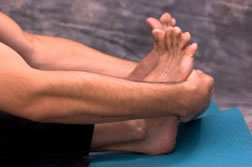 It’s important to get enough exercise for yourself and for your feet, the foundations of your body. Running offers many different benefits, physically, mentally, and emotionally. When you run, it helps increase your heart rate, your blood circulation, your heart muscles, your breathing, improves flexibility and overall muscle health and mass, reduces stress, and helps with sleep.
It’s important to get enough exercise for yourself and for your feet, the foundations of your body. Running offers many different benefits, physically, mentally, and emotionally. When you run, it helps increase your heart rate, your blood circulation, your heart muscles, your breathing, improves flexibility and overall muscle health and mass, reduces stress, and helps with sleep.
Exercising your feet regularly with the proper foot wear is a great way to prevent injuries. If you have any concerns about your feet, contact one of our podiatrists of Livingston Footcare. Our doctors will treat your foot and ankle needs.
Exercise for Your Feet
Exercise for your feet can help you to gain strength, mobility and flexibility in your feet. They say that strengthening your feet can be just as rewarding as strengthening another part of the body. Your feet are very important and often we forget about them in our daily tasks. But it is because of our feet that are we able to get going and do what we need to. For those of us fortunate not to have any foot problems, it is an important gesture to take care of them to ensure its good health in the long run.
Some foot health exercises can include ankle pumps, tip-toeing, toe rise, lifting off the floor doing reps and sets, also flexing the toes and involving the shins may help too. It is best to speak with your doctor regarding how to do these fitness steps and how often is right for you. Everyone’s needs and bodies are different and it varies from individual to individual to determine what should be done for you to maintain strength in your feet.
Once you get into a routine of doing regular exercise, you may notice a difference in your feet and how strong they may become.
If you have any questions feel free to contact our office located in North Brunswick, NJ. We offer the newest diagnostic tools and technologies to fit your foot and ankle needs.
 Rheumatoid arthritis is a debilitating autoimmune disease that occurs when the body’s immune system begins attacking healthy cells. This results in pain, stiffness, and swelling of the body’s joints. Rheumatoid arthritis can affect anyone, regardless of age. The condition also commonly affects women more than men, and can be associated with other health risks such as high blood pressure. It’s important to see a doctor to have your condition properly diagnosed and treated.
Rheumatoid arthritis is a debilitating autoimmune disease that occurs when the body’s immune system begins attacking healthy cells. This results in pain, stiffness, and swelling of the body’s joints. Rheumatoid arthritis can affect anyone, regardless of age. The condition also commonly affects women more than men, and can be associated with other health risks such as high blood pressure. It’s important to see a doctor to have your condition properly diagnosed and treated. Because RA affects more than just your joints, including the joints in your feet and ankles, it is important to seek early diagnosis from your podiatrist if you feel like the pain in your feet might be caused by RA. For more information, contact one of our podiatrists of Livingston Footcare. Our doctors will treat your foot and ankle needs.
What Is Rheumatoid Arthritis?
Rheumatoid Arthritis (RA) is an autoimmune disorder in which the body’s own immune system attacks the membranes surrounding the joints. Inflammation of the lining and eventually the destruction of the joint’s cartilage and bone occur, causing severe pain and immobility.
Rheumatoid Arthritis of the Feet
Although RA usually attacks multiple bones and joints throughout the entire body, almost 90 percent of cases result in pain in the foot or ankle area.
Symptoms
- Swelling & pain in the feet
- Stiffness in the feet
- Pain on the ball or sole of feet
- Joint shift and deformation
Diagnosis
Quick diagnosis of RA in the feet is important so that the podiatrist can treat the area effectively. Your doctor will ask you about your medical history, occupation, and lifestyle to determine the origin of the condition. Rheumatoid Factor tests help to determine if someone is affected by the disease.
If you have any questions feel free to contact our office located in North Brunswick, NJ. We offer the newest diagnostic tools and technologies to fit your foot and ankle needs.
Although rheumatoid arthritis attacks multiple bones and joints throughout the entire body, ninety percent of people who actually develop this condition usually do so in the foot or ankle area. Those who develop this kind of arthritis in the feet usually develop symptoms around the toes and forefeet first, before anywhere else. Rheumatoid arthritis appears to have a genetic component. If it runs in the family, then you will be more likely to develop it as well.
Rheumatoid arthritis is an autoimmune disorder in which the body’s own immune system attacks the lining of the membranes surrounding the joints. This causes inflammation of the membrane lining, and the gradual destruction of the joint’s cartilage and even bone.
Some of the most common symptoms that are associated with RA include pain and swelling of the feet. Stiffness in the feet is also another common symptom that people experience. Those who have RA in the feet usually feel the pain in the ball or sole of their feet. This can get to be very painful at times. A person's joints can even shift and become deformed after a period of time.
In order to properly diagnose RA in the feet it is usually necessary for a doctor or podiatrist to evaluate the area. Your doctor will also question you about your medical history, occupation, etc., to determine whether anything in your lifestyle may have triggered the condition. There are a number of tests that may be performed to help diagnose RA, such as a rheumatoid factor test. There is, however, no one single test that will tell you for sure if you have RA. There are different X-rays that can be taken as well to determine if a person has RA in their feet.
There is a range of treatment options for rheumatoid arthritis. Treatment of RA is usually a lifelong process that includes a variety of methods of treatment and therapy. Your doctor can prescribe special shoes that should help with arch support as well as heel support. A physical therapist can help those with this condition learn exercises which will keep their joints flexible. Surgery may be needed to correct some of the issues with the feet, such as bunions, and hammertoes. Fusion is usually the most successful surgical option for rheumatoid arthritis. However, people need to keep in mind that there are some risks associated with these surgeries.